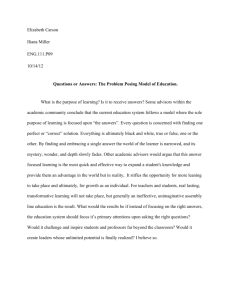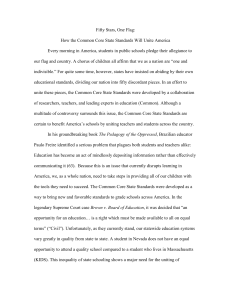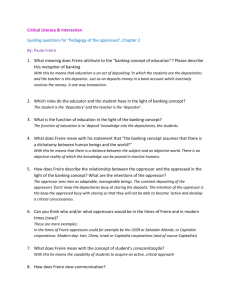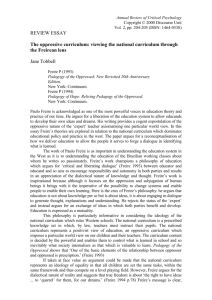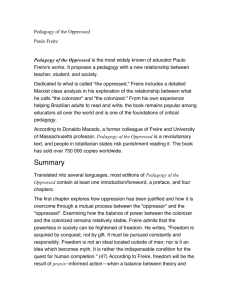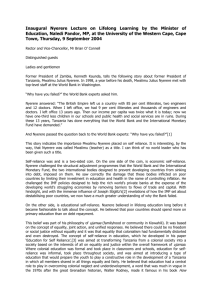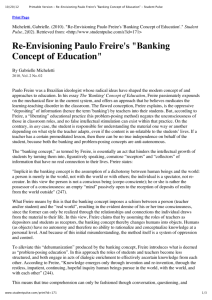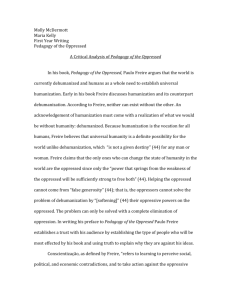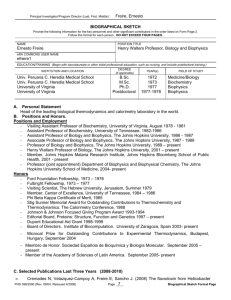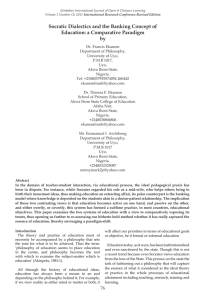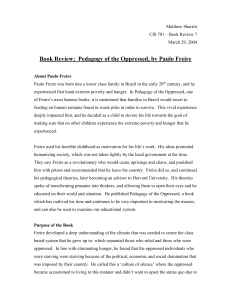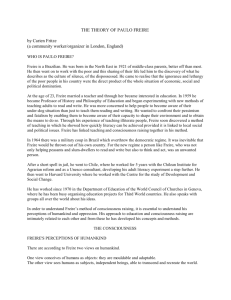Julius Nyerere Annual Lifelong Learning Lecture University of the
advertisement
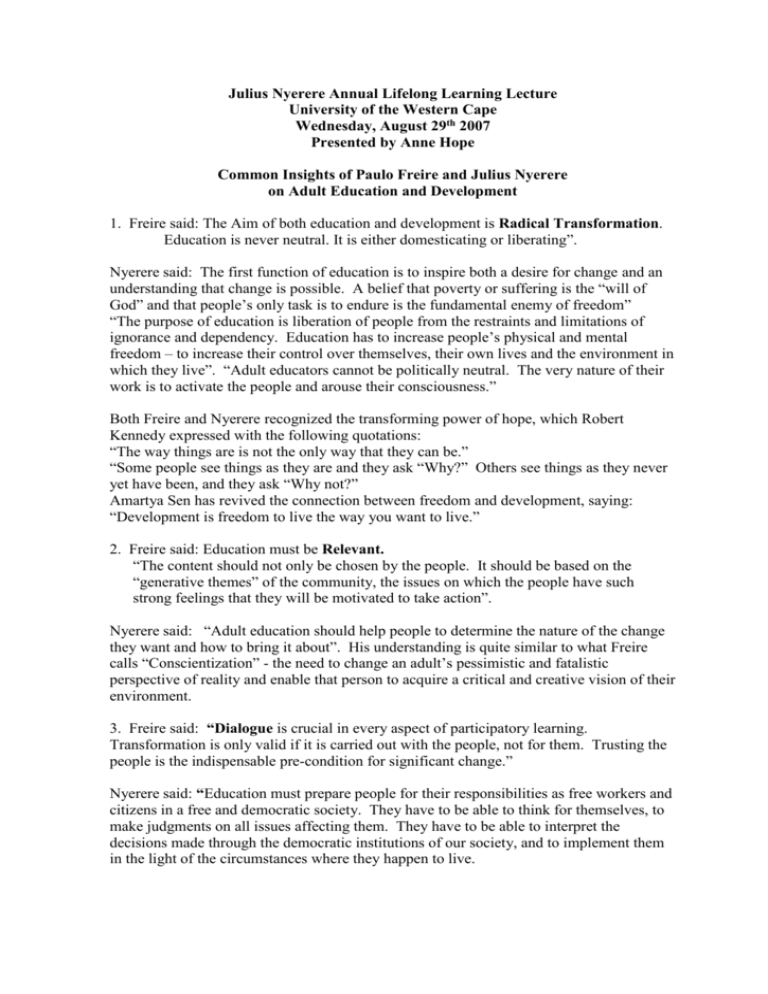
Julius Nyerere Annual Lifelong Learning Lecture University of the Western Cape Wednesday, August 29th 2007 Presented by Anne Hope Common Insights of Paulo Freire and Julius Nyerere on Adult Education and Development 1. Freire said: The Aim of both education and development is Radical Transformation. Education is never neutral. It is either domesticating or liberating”. Nyerere said: The first function of education is to inspire both a desire for change and an understanding that change is possible. A belief that poverty or suffering is the “will of God” and that people’s only task is to endure is the fundamental enemy of freedom” “The purpose of education is liberation of people from the restraints and limitations of ignorance and dependency. Education has to increase people’s physical and mental freedom – to increase their control over themselves, their own lives and the environment in which they live”. “Adult educators cannot be politically neutral. The very nature of their work is to activate the people and arouse their consciousness.” Both Freire and Nyerere recognized the transforming power of hope, which Robert Kennedy expressed with the following quotations: “The way things are is not the only way that they can be.” “Some people see things as they are and they ask “Why?” Others see things as they never yet have been, and they ask “Why not?” Amartya Sen has revived the connection between freedom and development, saying: “Development is freedom to live the way you want to live.” 2. Freire said: Education must be Relevant. “The content should not only be chosen by the people. It should be based on the “generative themes” of the community, the issues on which the people have such strong feelings that they will be motivated to take action”. Nyerere said: “Adult education should help people to determine the nature of the change they want and how to bring it about”. His understanding is quite similar to what Freire calls “Conscientization” - the need to change an adult’s pessimistic and fatalistic perspective of reality and enable that person to acquire a critical and creative vision of their environment. 3. Freire said: “Dialogue is crucial in every aspect of participatory learning. Transformation is only valid if it is carried out with the people, not for them. Trusting the people is the indispensable pre-condition for significant change.” Nyerere said: “Education must prepare people for their responsibilities as free workers and citizens in a free and democratic society. They have to be able to think for themselves, to make judgments on all issues affecting them. They have to be able to interpret the decisions made through the democratic institutions of our society, and to implement them in the light of the circumstances where they happen to live. 4. Freire said: Problem-posing is prophetic, and as such is hopeful… It affirms people as beings who transcend themselves, who move forward and look ahead. Looking at the past must only be a means of understanding more clearly what and who they are, so that they can more wisely build the future”. Nyerere said: “Education must contribute to an enlargement of people’s ability in every way; in particular it must help people to decide for themselves – in co-operation - what development is. It must help people to think clearly; it must enable them to examine the possible alternative courses of action, to make a choice between those alternatives in keeping with their own purposes, and it must equip them with the ability to translate their decisions into reality.” 5. Freire said: “The Cycle of Reflection and Action Cycle is central to the whole purpose of community transformation. Reflection without action is just empty verbiage, and action without reflection is merely busyness”. Nyerere said: Education must lead to Self –reliance. Adult Education incorporates anything which enlarges people’s understanding, activates them and helps them to make their own decisions, and to implement these decisions for themselves. It includes training but it is much more than training. It includes what is generally called “agitation” but is much more than that. It includes organization and mobilization, but it goes beyond them to make them purposeful”.
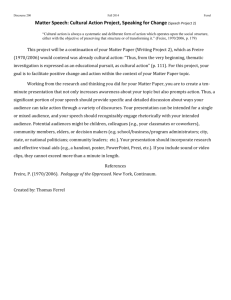
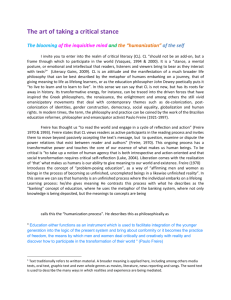
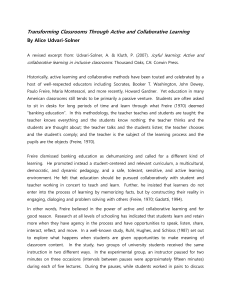
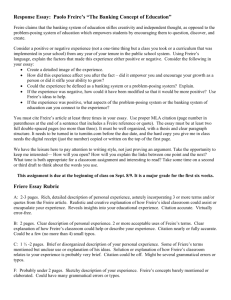
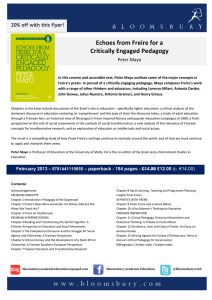
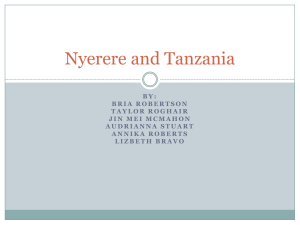
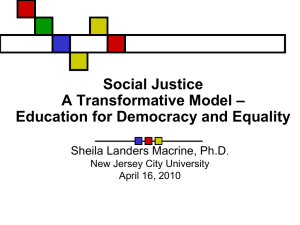
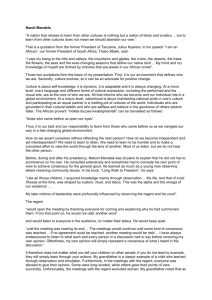
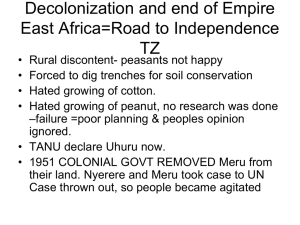
![NyerereandTanzania[1]](http://s2.studylib.net/store/data/010105845_1-19c0ad30f2fc2d1c2e73f2a1fcbde127-300x300.png)
